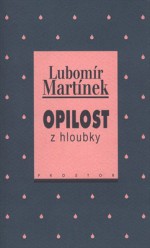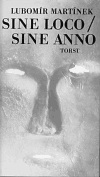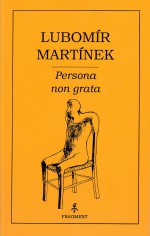Prose writer and essayist, recipient of the Tom Stoppard Prize (2008) and a Magnesia Litera for prose (2008). An emigré who lives alternately in France and the Czech Republic. He was born in České Budějovice on 9 May 1954. He graduated from an engineering college then worked as an engineer, an assistant planner and later as a stagehand in a theatre. After emigrating to France in 1979, one of his many jobs was that of a sailor, which saw him travel across the world, and his work contains motifs from journeying, wandering and exile.
Lubomír Martínek

The Myth of Lynke
Mýtus o Lynkeovi

Fuel to the Flames
Olej do ohně

A Long Game of Billiards
Dlouhá partie biliáru
| Title | Publisher | Year | Selected published translations | Awards |
|---|---|---|---|---|
| Flight of the Turtle (Let želvy) | Revolver Revue | 2013 | ||
| The Nutmeg (Muškátový oříšek) | Revolver Revue | 2012 | ||
| Blood Poisoning (Otrava krve) | Revolver Revue | 2009 | ||
| The Myth of Lynke (Mýtus o Lynkeovi) | Paseka | 2008 |
2009 Tom Stoppard Prize |
|
| Fuel to the Flames (Olej do ohně) | Paseka | 2007 |
2008 Magnesia Litera – Prose |
|
| A Long Game of Billiards (Dlouhá partie biliáru) | Paseka | 2004 | ||
| Between Noon and Midnight (Mezi polednem a půlnocí) | Paseka | 2001 | ||
| Drunkenness of Depths (Opilost z hloubky) | Prostor | 2000 | ||
| By the Way (Mimochodem) | Paseka | 2000 | ||
| Quiproquo (Quiproquo) | Prostor | 1998 | ||
| Sine loco, sinne anno (Sine loco, sine anno) | Torst | 1998 | ||
| Palimpsest (Palimpsest) | Prostor | 1996 | ||
| Cape of Good Hopelessness (Mys dobré beznaděje) | Český spisovatel | 1994 | ||
| Nomad´s Land (Nomad’s Land) | Prostor | 1994 | ||
| Persona non grata (Persona non grata) | Fragment | 1993 | ||
| Line 2 (Linka č. 2) | Československý spisovatel | 1992 |

Blood Poisoning
Otrava krve

The Myth of Lynke
Mýtus o Lynkeovi

Fuel to the Flames
Olej do ohně

A Long Game of Billiards
Dlouhá partie biliáru

Between Noon and Midnight
Mezi polednem a půlnocí

Drunkenness of Depths
Opilost z hloubky

By the Way
Mimochodem

Quiproquo
Quiproquo

Sine loco, sinne anno
Sine loco, sine anno

Palimpsest
Palimpsest

Cape of Good Hopelessness
Mys dobré beznaděje

Nomad´s Land
Nomad’s Land

Persona non grata
Persona non grata

Line 2
Linka č. 2
| Award | Year | Country |
|---|---|---|
| Tom Stoppard Prize | 2009 | Česká republika |
| Magnesia Litera – Prose | 2008 | Česká republika |
Praise
One of the keys to the multi-layered prose and essayistic work of Lubomír Martínek is modern man’s search for his lost identity. Instead of people at home in a healthy egoism, instead of Renaissance condottieri of Faustian and Quixotic individualism, in Martínek’s view the contemporary world is populated by the tottering shadows of individuals who exhibit strong narcissistic tendencies and want “to live and die in front of a mirror”.
—Karel Haloun
Czech Television, Čtenářský deník...
His first book was Představení (Performance, samizdat, Cologne, 1986), while other collecitons were published abroad: Tipp-ex fluid & jiné idiotexty (Tipp-ex fluid and Other Idiotexts, Paris, 1987), Persona non grata (Paris, 1988), Sine loco – sine anno, Palubní nocturnal (Ship’s Nocturnal) and Errata (Paris, 1990) and Quiproquo (Paris, 1991). The first book to be published in his own country was Linka číslo 2 (Line 2, Československý spisovatel, 1992, in French in 1986 as Porte Dauphine -Nation). This refers to the longest line of the Paris metro – and it is here where Martínek’s poetical essays are set. There then followed the collection of travel writing Mys dobré beznaděje (Cape of Good Hopelessness, Československý spisovatel, 1994).
The prose work Opilost z hloubky (Drunkenness of Depths, Prostor, 2000) deals with the difficulties an emigré faces when returning to his homeland. The novel Mezi polednem a půlnocí (Between Noon and Midnight, Paseka, 2001) provides a sailor’s detailed account of the wide range of characters that can be met on a journey. In Olej do ohně (Fuel to the Flames. Paseka, 2007) he offers his main characters an unidentified port, but not even this can protect them from their worsening situation. For these short stories the author was awarded a Magnesia Litera for prose in 2008. In his review for the newspaper MFDnes, Josef Chuchma wrote, “I consider the opening short story to be quite exceptional. It is one of the most harrowing stories to have come out in Czech literature in recent years.”
In his essay, Mýtus o Lynkeovi (The Myth of Lynke, Paseka, 2008), he uses the allegory of the Argonauts to find out what it means to see and to understand. In a review for the newspaper Právo, Tereza Radváková wrote of the author’s conclusions that, “Human society perfectly controls the technology that makes individuals close their eyes. According to Martínek, the fundamental stage in the creation of blindness is schooling. During the lessons, habits are formed to be used in typical situations. The machinery of stereotypes grinds down individual personality into the grey mass, which lives within the boundaries of an automatic view of reality.”
The autobiographical prose, Muškátový oříšek (The Nutmeg, Revolver revue, 2012), sets out against the fickle consumption of experiences which today’s fast-moving age offers. On a journey to Indonesia he finds out more about himself than the natives.
The thirteen stories in the collection Let želvy (Revolver revue, 2013) are linked by the main character Leon – a traveller and searcher. “So which values does Leon prioritise? Above all he says that there is no universal answer to everything. Based on the number of different places in the texts, it is only when he is at a different location that he is able to become himself and get rid of his prejudices. His immediate problems and family worries then disappear and he can overcome his bad habits, while finding the courage to look at himself. To change, to come to terms with the environment, to discuss and understand, to give priority to reality over dreams, to live in the present, to seize opportunities, to freely choose between opportunities and take responsibility for those choices,” explained Lucie Holá in a review for the magazine Přítomnost.
Martínek’s work is also to be found in a range of collections and anthologies, and he regularly collaborates with the literary reviews Labyrint and Revolver revue.


